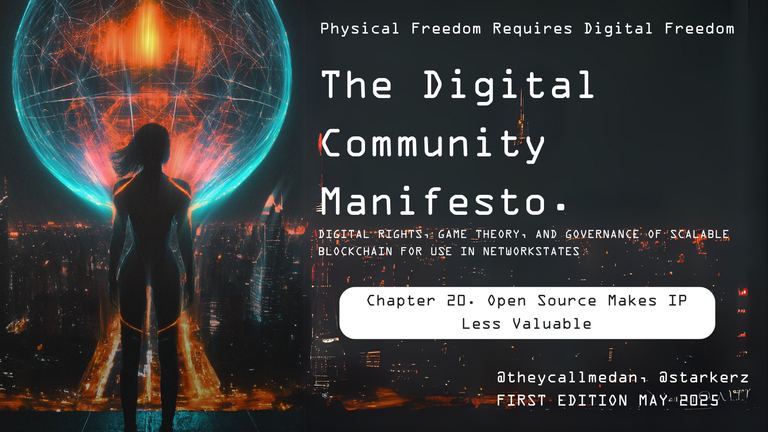Securing Digital Rights for Communities (Game Theory and Governance of Scalable Blockchains for Use in Digital Network States)
Chapter 20. Open Source Makes IP Less Valuable
A new business model is to accumulate the governance token and give the rest away for free

Audio version
Introduction
Open source development challenges the traditional value of intellectual property. In a blockchain ecosystem built on open source principles, code can be freely copied, iterated upon and improved by anyone. Instead of focusing on proprietary software or brand protection, the emphasis shifts to tokenizing a base layer protocol that gains value from community driven network effects.
20.1 Why Traditional IP Models Will Weaken
20.1.1 Copy and Iterate
In open source projects, anyone can copy the code and iterate upon it. This significantly reduces the power of patents and copyrights that typically protect software. Once the code is public, forks and variations can proliferate without legal barriers. It also vastly reduces the amount of work required to build a new digital project or product in cases where the original source code are used as the basis for that project.
20.1.2 No centralised Enforcement
Truly decentralised systems are resistant to lawsuits. You cannot sue an amorphous community of contributors or node operators, especially when many use pseudonymous identities. Traditional IP enforcement mechanisms lose their potency.
20.2 Accumulating the Base Token Instead of IP
20.2.1 Governance Rights Accumulation as the Business Model
Because open source leaves little “IP rent” to collect, builders accumulate governance or utility tokens in the underlying blockchain as a result of having received community votes for their valuable contributions to code building. As the ecosystem grows, the quality of products improves, a network effect takes hold in the user base, adoption increases, and the token’s value can rise.
20.2.2 Community Ownership
Projects no longer rely on proprietary lock in. Instead, they encourage developers to improve the code and create stronger network effects. Holding more of the base layer token gives influence and a direct stake in the ecosystem’s success, which incentivises further contributions from developers.
20.3 Abundance vs. Scarcity of IP
20.3.1 Abundant Code
In a fully open source environment, code is shared, and even brand elements can be replicated or remixed. This approach prioritizes expanding overall utility rather than controlling a limited pool of IP.
20.3.2 Power of The Network Effect
Instead of leveraging a single brand or patent, participants focus on building a strong community. The most valuable resource becomes the network of users, developers, and infrastructure operators all benefiting from a thriving token economy.
20.4 Brand and Community Tensions
20.4.1 Forking Logos and Names
In decentralised contexts, truly decentralised communities can mimic or adapt a project or brand’s logo or name. Traditional lawsuits become impractical since there is no central entity to target. Attempts at enforcement can even backfire by uniting the community against the IP owner.
20.4.2 Brands Aligning with Their Community
Companies must adopt new ways to cooperate with decentralised user bases rather than trying to dominate them or see the data the generate as the sole property of the company to mine, sell and monetise. Real value lies in fostering community loyalty and participation, giving them skin in the value system via fair distribution of tokens / stake, not in clinging to trademarks or brand identities.
20.4.3 Stake for Resources
In a well designed, decentralised system, users or apps stake the token to gain network bandwidth. Developers build open source apps and receive tokens either by purchasing them on the market or earning them through community rewards for having done something valuable for the community itself.
20.4.4 Intrinsic Utility
A well designed, decentralised system offers censorship resistant text storage, fast and fee-less transactions, and stablecoin infrastructure. Its core is maintained by distributed contributors who share a common stake in the token of the community.
20.5 Suing a Distributed Community
20.5.1 Impossible Central Target
A fully decentralised network has no “headquarters” to subpoena. If there is no pre-mine, no foundation, and no single entity, lawsuits over IP infringement have no direct target.
20.5.2 Communities Undermining IP Laws
As a network becomes more censorship resistant and globally distributed, it becomes harder for IP owners to enforce claims. Communities operating worldwide with pseudonymous digital identities render legal pressures over trademarks and copyrights less effective.
Conclusion
Code Freedom Over IP: Open source software weakens traditional IP claims. Anyone can copy and improve code without significant legal fear.
Token-Based Incentives: Instead of profiting from patents, developers accumulate the base layer token, aligning them with long term ecosystem growth which in most cases incentivises further open source contributions from developers and other community members who want their existing stakes to grow in value.
Community as Strength: Brands and logos can be forked in truly decentralised systems. The most influential brand is the one the community supports, not the one with the most lawyers.
No Central Point to Sue: Fully decentralised projects lack a headquarters, owner, central figurehead or foundation. IP related lawsuits have no clear way to shut them down.
Focus on Network Effects: Real value flows from community collaboration and user adoption. Open source accelerates ecosystem growth by inviting a broad range of contributors and forks.
When open source principles merge with decentralised governance, traditional IP loses its status as a profit centre. Economic rewards shift away from proprietary ownership and toward token staking in an ever-growing, cooperative network.
Congratulations @networkstate! You have completed the following achievement on the Hive blockchain And have been rewarded with New badge(s)
Your next target is to reach 2750 upvotes.
You can view your badges on your board and compare yourself to others in the Ranking
If you no longer want to receive notifications, reply to this comment with the word
STOPCheck out our last posts: